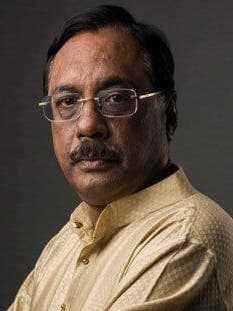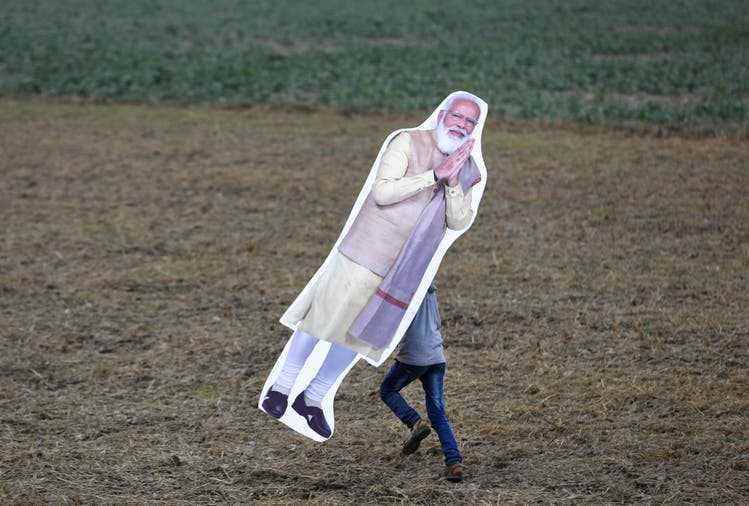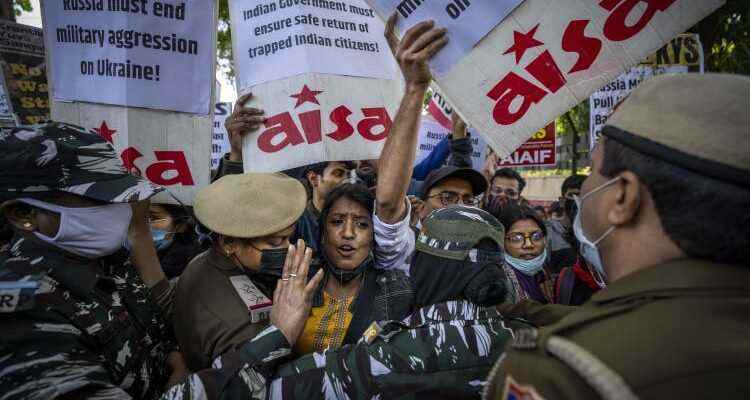Author Pavan K. Varma explains India’s position in the Ukraine War and how the country’s colonial legacy has fueled modern-day Hindu nationalism.
Indian students protest against Russian invasion of Ukraine.
Mr. Varma, India does not want to upset either Russia or the West in the Ukraine war. You are a former Indian diplomat. What do you think of this balancing act?

I think it’s dictated by national interest. And partly through civilizational heritage: India wants to have its own position on international affairs and not just blindly follow the herd. India was not part of a bloc even during the Cold War. A country with such a great intellectual and civilizational heritage wants to have its own attitude. It doesn’t want to have an opinion dictated to it.
During Indian Prime Minister Narendra Modi’s European tour in May Heads of state tried in vain to persuade him to take a clear position on Russia. How would you explain India’s position in the Ukraine war?
India opposes aggression against a sovereign country, contrary to international law. India is also against the atrocities that happened in Ukraine. India has pushed for an immediate ceasefire so that peace talks between Ukraine and Russia can take place. But we find it difficult to pick sides and judge the conflict on a black and white basis. If the USA invades Iraq, if NATO countries drop bombs on Libya and pose as the world police without the necessary international approval – we believe that too is wrong. We want an international system in which all countries respect the sovereignty of other nations.
Modi is very self-confident in the West, he deliberately doesn’t speak English and doesn’t answer questions from journalists. Does it even matter to India what the West thinks of it?
It matters because we live in an interdependent global village. India is not an island. It has important relations with the USA, with the EU. Our job is to convince all sides that this war is against global interests. We believe in a middle ground in which the warring parties negotiate with each other.
Otherwise, India is particularly sensitive to criticism from the West.
Yes, there is this asymmetry. It still exists today between the colonized and the colonial masters, even if colonialism in its classic form is over. India’s elite is overly sensitive to criticism or even praise from the West. When the West praises us, we react with exuberant euphoria, it criticizes us, with incomprehensible dejection. I plead for more balance.
Author and former diplomat
Pavan K Varma
fig. Delhi · The author Pavan K. Varma, 68, is a former Indian diplomat. He was stationed in Cyprus, London and Bhutan. He sat in the national parliament for the Janata Dal party, a former coalition partner of the ruling BJP. Today he is vice president of the opposition party Trinamool Congress. Varma is a widely read conservative author and popular talk show host on Indian television. His book “Becoming Indian” dealt with the Indians’ difficult search for identity, his latest work is called “The Great Hindu Civilisation”.
You wrote the book “Becoming Indian” about the search for an Indian identity. Why hasn’t India found it 75 years after independence?
The search continues because few have analyzed the cultural and intellectual consequences of colonialism. Colonialism is not simply physical oppression, it is much more the colonization of the spirit. One of the first things the colonizer picks up is language. India is extremely rich in languages, there are over 24, they are thousands of years old. The colonial rulers forced a new language on us, which we can never master like our mother tongue. At the same time, they cultivated a sense of inferiority among the locals when they used their own language. The British fleeced a total of $42 trillion from India. But the loss of language, of intellectual self-confidence, of independent curricula, of social and cultural preferences was far greater. Countries need decades to recover from this.
Your first language is also English.
Yes. But I’m also fluent in Hindi, it was a personal effort, I didn’t want to be a linguistic mongrel – constantly unsure of the language of the colonial masters and remote from the wealth of my own language. But nothing helped me to learn Hindi, my schools were Saint Columbus, Saint Xavier, Saint Stephen, the language of instruction was English. The level of English determined one’s social status, even if one had few other qualifications. Suddenly doors opened, to employers, to posts, to clubs.
We live in a globalized world. Why is it so important to find an Indian identity?
One of the great myths of globalization is that we are all the same. We all watch CNN, we eat the same hamburgers, we watch the same Hollywood movies. You and I, we speak English, we have a cosmopolitan lifestyle. But we are culturally different in countless ways. If I meet an old person, I touch their feet – I don’t think you do. One of the great challenges of the future will be to maintain these differences in a globalized world. The levellers in the West need to understand that.
In “Becoming Indian” you write that the Indian elite is copying a Western lifestyle, has lost contact with their culture and is leaving religion and traditions to the fundamentalists.
If you have an elite, uprooted and cut off from their culture, but still possessing privilege and power, eventually there will be a backlash.

A cardboard Narendra Modi at an election rally. The Hindu nationalist’s election was also a backlash against the Indian elite.
Her book was published in 2010, four years later the Hindu nationalist Narendra Modi won the election. Was that the backlash?
That was definitely part of it. The colonial rulers had created an elite in India in their own image. After colonial rule, India embarked on a journey towards authenticity, wanting to free itself from colonial legacies. During this journey, the equalizing globalization happened. Everyone wanted jeans and t-shirts and Kentucky Fried Chicken. Don’t get me wrong, I have nothing against any of this. But without falling into xenophobia or chauvinism, each country should make its own decisions and not become a copy of another.
Modi’s party, the BJP, promises to restore India’s lost greatness. In fact, you should be happy about that.
What is happening now is an over-glorification of the past. The far right claim that Hindus had airplanes, nuclear power, television thousands of years ago. In doing so, they trivialize the actual achievements of this civilization. I accuse the BJP of only disseminating declarations of intent. She doesn’t go through the arduous task of revising curricula and introducing boys to our actual culture in a balanced way. I’ll give you an example from my school days: I learned more about British history and Australian geography than about my country. The BJP always speaks of Indian culture. But every year she reduces the budget of the Ministry of Culture. Thousands of talented artists in this country live on the poverty line.
Where does this over-glorification of the past lead?
To arbitrary exclusion. The Muslim Mughals who ruled the subcontinent in the Middle Ages came from Afghanistan, and ancient India ended with them. This has made unbelievable progress in mathematics, in philosophy, in languages, created something unprecedented at that time. We should appreciate that. But not in this simplistic, uneducated, illiterate glorification.
In this revived glorious past of Hindu nationalists, Muslims have no place.
Anything that is not obviously Hindu or ancient is now considered optional. For example, the great Muslim poet Faiz Ahmed Faiz was removed from the 10th grade curriculum because he writes in Urdu, which is said to be the language of Pakistan. But Urdu is a language of India! We cannot speak two sentences in Hindi without borrowing a word in Urdu. This fanaticism, this hatred – this is not my civilization.
Where will India develop?
I believe the essence of India is an enlightened balance. We are not a civilization of extremes. We are witnessing a resurgence of pride in India coupled with a lack of knowledge of our heritage. Together this leads to the idea that our culture is exclusive, when it once had the confidence to absorb other influences without losing its identity. India was full of foreign influences even before the Mughals came in the Middle Ages. We must be proud. But we also need to know more about India. Only then will we find balance.
Where does this balance lie between the colonized’s search for identity and blind fanaticism?
Finding the balance means knowing what we want to preserve from our culture and what we borrow from others. I am convinced that we can do it. After their departure, the colonial masters leave behind a corrupted and privileged elite. Then the setback comes to the extreme. After that we find the balance.
The BJP has just had another electoral victory and it doesn’t look like they’ll be defeated any time soon.
There is already a counter-movement. Hindus don’t like it when someone tells them eat this! Dress like this! These self-proclaimed guardians of Hinduism know very little about the great ideas of this religion, about its complexity and its nuances.
